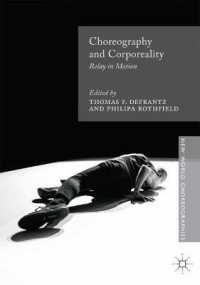- ホーム
- > 洋書
- > 英文書
- > Philosophy
Full Description
In her new book, Catherine Malabou argues that the French Revolution existed in name only, not in reality - privileges disappeared only on the surface and the old forms of domination persisted in structuring everyday life. And, sure enough, French citizens soon came to ask: "How is it that we are falling back into the same patterns of privilege and servitude?"
In developing this argument, Malabou echoes the conclusion drawn by Pierre-Joseph Proudhon, whose work, What is Property?, written in 1840, claimed that there was no revolution. Proudhon witnessed how, in the aftermath of the French Revolution, feudal relations persisted and monarchy was restored. He connected the persistence of feudalism and servitude to his critique of property. For Proudhon, property is but another name for domination: "Property is theft," he famously declared; by which he meant that private property starts with a theft of memory and meaning that transforms continuous bondage into a promise of emancipation. This marks the specificity of the anarchist critique of property, and it led Proudhon to conclude "I am an anarchist."
Malabou connects her re-reading of Proudhon's masterpiece with our own political situation today, more than two hundred years after the French Revolution. She examines how the enduring domination that is central to private property infiltrates various aspects of the modern world, from the legacies of colonialism and slavery to work and politics. This timely re-assessment of the relation between property and domination will be of interest to students of philosophy and politics, and to anyone concerned with today's key political questions.
Contents
Translator's Note
1. Aubaine right
"Property" and "private property"
Marx: defining property as theft presupposes the existence of property
Theft as junction point
Proudhon's skeleton key: aubaine right
The modern meaning of aubaine
The medieval meaning of aubaine
On inheritance
Changing lineages
The finding
The approach
2. Contemporary Critiques of Private Property:
Commons, Colonial Dospossession, Revisiting Anarchism
The neoliberal wall
Is the age of access the end of the means of production?
No change
The commons
Colonial dispossession
Proudhon, yes-but no, not anarchism
Back to Marx
The "oxymoron"
3. "Property is Impossible" (Marx/Proudhon)
Theft as performative act
Ten propositions
Marx: from praise to caricature
Disregarding aubaine right
From proportionality to disproportionality
4. The Aporias of Primitive Accumulation (Proudhon/Marx)
Marx on theft
Primitive accumulation and the long transition
Kropotkin to Proudhon's rescue
5. Timelines of the French Revolution
Continuities and blackouts
An erasure saturated with memory
The theft of something that never existed
"In their heart"
6. Aubains, serfs and bastards: the taint of three tars
The aubain's servitude
"Aubenage", or the serf as aubain: mortmain
Bastards are serfs and aubains
Shipwreck right
Tars and traces
Physical mark, symbollic tar
Two types of forfeiture
From the outset
7. Outsiders and Insiders
Extraterritoriality and marginality
Sahlins' analysis of the invention of naturalization
Totality and fragmentation
Cerutti's study of the liminal state of property and the uncertainty of the disinherited vulnerability and weak belonging
Belonging to no one at all
8. And yet...
9. The Impossible Demarcation
The feudal property system
"Revolutionary" property
The challenges of the Great Demarcation: paying relief, abolishing
The failure
Proudhon's conclusions
Powerful as the King
10. On Neo-Feudalism
Techno-feudalism
Contemporary versions of aubaine right
11. Examining Self-Government: From "commons" to common
The "program"
Self-management versus self-government
Some definitions
Are Ostram and Proudhon fighting the same battle?
From plural (commons) to singular (common)
Best intentions
Antipathy for the principle of authority
Is community everything or nothing?
12. Servitudes: In the land of freedom
The Edict of Louis X: "There are no slaves in France"
On and off French soil
The dual appropriation of Toussaint Louverture
Unthought twice over
Servitude, serfdom, slavery. Proudhon's ambivalence
From slavery to servitude: the hesitation of historians
The historians' cross to bear: relations between ancient slavery and feudal serfdom
Transatlantic slavery denial
Césaire the federalist
Back to "Theft is property!"
13. Anarchies of the Revolution
Anarchy as the internal debate of the Revolution
Anarchy between Revolution and Republic
Property
Equality
Separation of powers
Sovereignty
From invective for forming
From forming to invective
The difficulties of self-designation
At the rish of going in circles
Notes
Index








